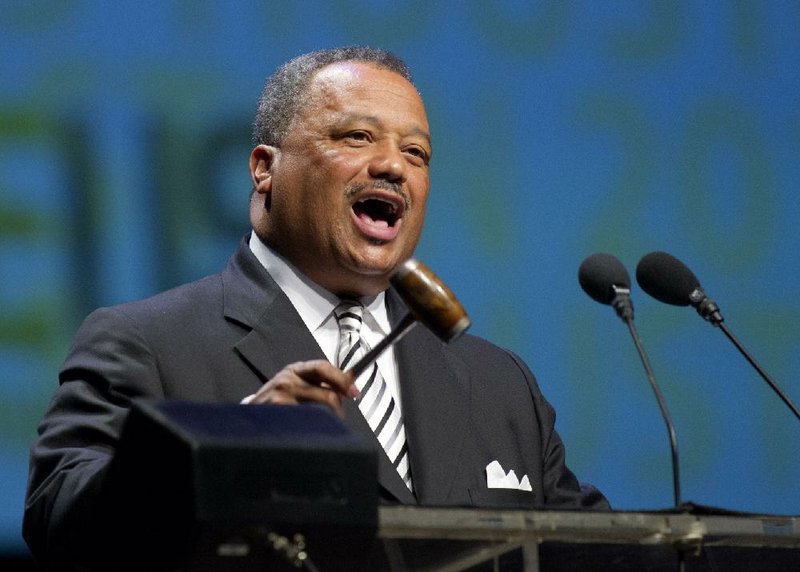HOUSTON - The Southern Baptist Convention passed a resolution by an overwhelming margin Wednesday denouncing the Boy Scouts of America’s decision to accept openly gay boys.
“Wow,” said the Rev. Fred Luter, president of the denomination, as he scanned the sea of ballots held up in approval Wednesday morning in Houston’s George R. Brown Convention Center. Nearly all of the 5,000 registered messengers, or delegates, voted in affirmation.
The Resolutions Committee took the long-expected resolution to the table during the final day of the Southern Baptist Convention’s annual meeting.
While the resolution expresses opposition to the Scouts’ policy change and concern that it could be “merely the first step toward future approval of homosexual leaders in the Scouts,” it stops short of instructing Southern Baptist churches to sever ties with the group. Rather, it expresses “support for those churches and families that as a matter of conscience can no longer be part of the Scouting family,” and encourages churches and families to advocate for reversal of the policy.
The resolution came after a motion advanced Tuesday to the Executive Committee urging the denomination to find an alternative leadership program for young boys that is more in line with the church’s biblical principles. The resolution implores Southern Baptists to consider expansion of the denomination’s Royal Ambassadors ministry, a Bible-centered discipleship organization for young boys that is similar to the Boy Scouts.
Since the Scouts’ national council voted May 23 to change its membership policy for boys - gay troop leaders are still not allowed - churches across the country have cut ties with Scout troops they once chartered.
In Arkansas, First Baptist Church of Gravel Ridge dropped its charter, and others have promised to do so, also.
Only one messenger, Charlie Dale of Indian Springs, Ala., spoke against the Scouts resolution.
“We’re talking about a 12-year-old boy who says he’s gay,” Dale said. “I don’t think we should kick such a boy out of our churches or our Sunday Schools. Let’s show him what real biblical manhood is about and love him.”
Dale added that he doesn’t think the Scouts are condoning homosexuality by accepting gay boys.
But the resolution text expresses worry that the new Scouts policy will “complicate basic understandings of male friendships, needlessly politicize human sexuality and heighten sexual tensions within the Boy Scouts.”
Half a dozen other speakers rose to applaud the resolution and suggest amendments.
“We need to take a firm hand against those who want to pull us away from what the Scripture says a young man ought to be,” said Byron Edens, pastor of Dug Gap Baptist Church in Dalton, Ga.
For the past century, Boy Scouts of America has excluded boys and troop leaders who are found to be homosexual. The Scout Oath includes a promise to “do my best to do my duty to God and my country.”
“Scouting is a great movement, but I’m sad to say it seems as though they’re moving away from the principles it was founded upon,” said Wes Taylor, an Eagle Scout and pastor of Tabernacle Baptist Church in Newport News, Va. “This is an attempt to open the door and broaden the acceptance of homosexuality.”
Messengers debated the resolution for about half an hour and proposed amendments to change the words “perceived sexual orientation” to “perceived sexual preference” and to strike the sections of the resolution that granted churches the choice to stay with the Scouts.
David Uth, pastor of First Baptist Church of Orlando, Fla., introduced an amendment asking those who stay involved with the Scouts to “seek to impact as many boys as possible with the life changing impact of Jesus Christ.”
“We have been given the Great Commission as the church, not the Boy Scouts,” he said. “We should seek in all partnerships to share the Gospel of Jesus Christ.”
His amendment was the only one that made the cut for the final resolution.
In a news conference after the meeting, members of the Resolutions Committee discussed the decision on the Boy Scouts, noting that although resolutions represent opinions of the denomination, Southern Baptist churches are autonomous and can do as they see fit. Steve Lemke, chairman of the Resolutions Committee and provost of New Orleans Baptist Theological Seminary, said that is why the resolution didn’t tell churches to sever ties with the Scouts.
“All the churches would have just laughed at us,” he said. “We have no authority to do that. All we ask is that our churches reassess.”
Lemke called the Boy Scouts resolution a “balanced middle way that respects what most Baptists believe.”
David Dykes, pastor at Green Acres Baptist Church in Tyler, Texas, and a member of the Resolutions Committee, said: “As a pastor, I appreciate the fact that the convention does not tell my church what to do.”
Denominational leaders stressed that they aren’t anti-Boy Scouts but had to respond to the organization’s actions.
“Baptists didn’t put this on the agenda,” said Russell Moore, president of the denomination’s Ethics and Religious Liberty Commission. “The Boy Scouts put this on the agenda. This is something to which we had to respond.”
Also on Wednesday, the Resolutions Committee presented 11 other resolutions that passed with little debate or amendment. Among them were:
Calling on college administrators and military organizations to respect religious freedom and to “stop requiring religious student groups to accept … those who do not share their core religiously informed beliefs.”
Affirming that the mentally ill are “of immeasurable value to God” and supporting the use of medical intervention for their treatment.
Supporting the victims of child sex abuse and human trafficking.
Supporting legislation to reduce America’s high incarceration rates and encouraging churches to support reintegration programs for former prisoners.
Next year’s meeting is to take place in June in Baltimore.
Front Section, Pages 1 on 06/13/2013
